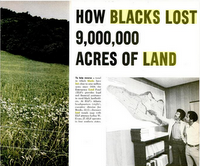
“There can be no strong economic base without a strong land base.”
How Blacks Lost 9 Million Acres of Land (Ebony, Oct 1974)
Chess players must balance protecting their own land with expanding their boundaries. He must make sure that the King is protected, while simultaneously closing in on the enemy King. While this is a skill to be developed over time, the player should always be aware that once he fails to protect his home, he becomes open for attack and could lose everything. A man without a home is a homeless man.
Upon being emancipated from slavery my great-great grandfather, James Gill, was given 2,000 acres of land to farm. It was a beautiful plot of land on the rolling hills of Marvel, Arkansas. At that time in America, all you needed was a piece of land, a few field hands, and some equipment. That combination and some hard work just about guaranteed that you family could thrive and ultimately create a better life for each following generation. That’s what my family and many other American families were driven to do at that time in history.
However, over four generations of James Gill’s family expanded beyond the land in Marvel. His sons and grandsons moved off the land. Some joined the military and others moved North and West for better opportunities. They started new families in Chicago and St. Louis. They left the farm life for better lives in the big cities. Eventually, those 2,000 acres shrank down to 20 acres. With few family members left to protect or cultivate the land, it was sold or lost to land traders. Like thousands of other black farmers, my family lost most of its inheritance to land speculators and partitioning.
We have managed to hold on to those last 20 acres. Until just a few years ago, there was an old house on the land that was built with some of the wood from the previous home, but that home was burned down in a fire. What remains is a plot of land, with a family cemetery uniquely positioned near the road with a stately sign baring the name “Gill Family Cemetery.” The hilly land is beautifully lined with old maple trees that know my family’s history. In 1994, my family decided to convert the remaining 20 acres of land into a family park. The plans include a pavilion and new house for family reunions and other community gathers.
At the ground breaking ceremony, my great uncle Dessie Gill, who lives in Marvel, welcomed a small crowd of relatives from around the country. I’ll never forget his words. He said, “our family has moved off of this land to faraway places with big buildings and lots of people. But, there is something I want you to know. When the big city gets you down, and your problems seem like more than you can bear, you've got some place to go. You can always come home.”
Coach Hodge
How Blacks Lost 9 Million Acres of Land (Ebony, Oct 1974)
Chess players must balance protecting their own land with expanding their boundaries. He must make sure that the King is protected, while simultaneously closing in on the enemy King. While this is a skill to be developed over time, the player should always be aware that once he fails to protect his home, he becomes open for attack and could lose everything. A man without a home is a homeless man.
Upon being emancipated from slavery my great-great grandfather, James Gill, was given 2,000 acres of land to farm. It was a beautiful plot of land on the rolling hills of Marvel, Arkansas. At that time in America, all you needed was a piece of land, a few field hands, and some equipment. That combination and some hard work just about guaranteed that you family could thrive and ultimately create a better life for each following generation. That’s what my family and many other American families were driven to do at that time in history.
However, over four generations of James Gill’s family expanded beyond the land in Marvel. His sons and grandsons moved off the land. Some joined the military and others moved North and West for better opportunities. They started new families in Chicago and St. Louis. They left the farm life for better lives in the big cities. Eventually, those 2,000 acres shrank down to 20 acres. With few family members left to protect or cultivate the land, it was sold or lost to land traders. Like thousands of other black farmers, my family lost most of its inheritance to land speculators and partitioning.
We have managed to hold on to those last 20 acres. Until just a few years ago, there was an old house on the land that was built with some of the wood from the previous home, but that home was burned down in a fire. What remains is a plot of land, with a family cemetery uniquely positioned near the road with a stately sign baring the name “Gill Family Cemetery.” The hilly land is beautifully lined with old maple trees that know my family’s history. In 1994, my family decided to convert the remaining 20 acres of land into a family park. The plans include a pavilion and new house for family reunions and other community gathers.
At the ground breaking ceremony, my great uncle Dessie Gill, who lives in Marvel, welcomed a small crowd of relatives from around the country. I’ll never forget his words. He said, “our family has moved off of this land to faraway places with big buildings and lots of people. But, there is something I want you to know. When the big city gets you down, and your problems seem like more than you can bear, you've got some place to go. You can always come home.”
Coach Hodge
 RSS Feed
RSS Feed
